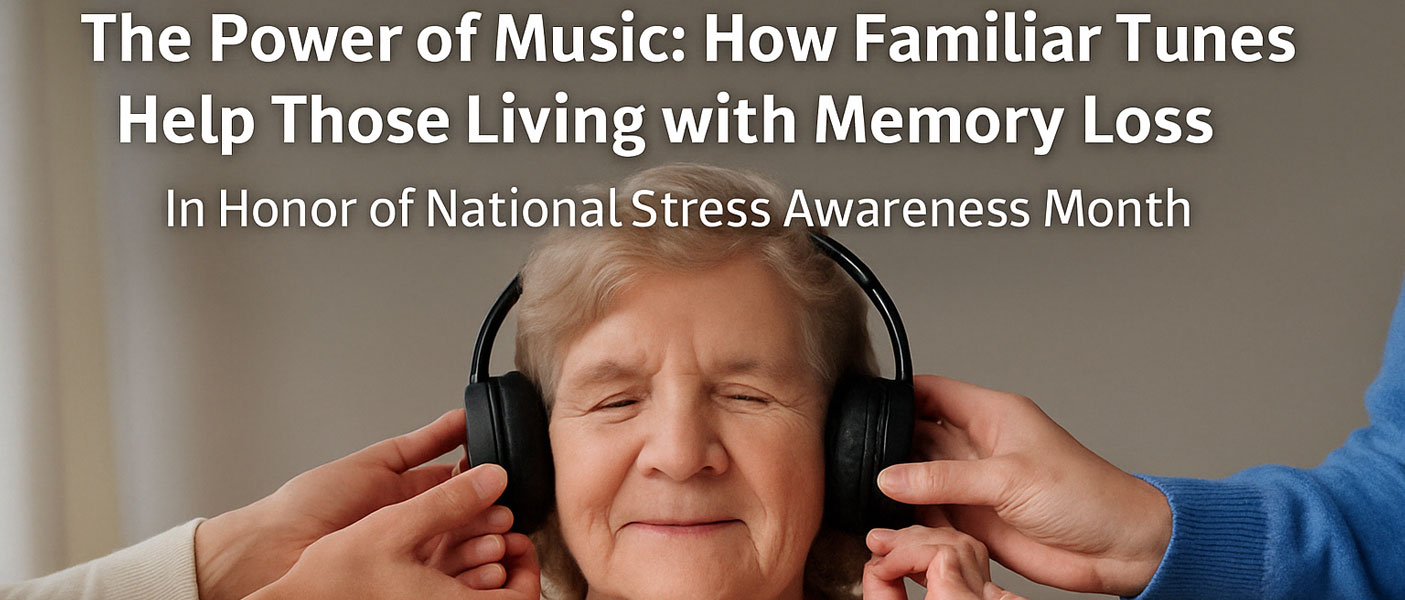In Honor of National Stress Awareness Month
Music has a unique way of reaching people—even when words or memories begin to fade. For individuals living with Alzheimer’s or other forms of dementia, familiar songs can do more than just entertain. Music can soothe anxiety, spark long-lost memories, and bring joy during even the most challenging moments.
As April marks National Stress Awareness Month, it’s a meaningful time to explore how music can reduce stress and support emotional well-being in those with memory loss. Whether you’re caring for a loved one at home or visiting them in a memory care community, incorporating music into your daily routine can make a profound difference.
Why Music Matters for People with Memory Loss
Music activates many different areas of the brain, including those associated with emotions and long-term memory. This is why someone who may struggle with conversation can still sing along to a favorite song from decades ago.
Here are some of the key ways music can help:
- Reduces anxiety and agitation: Calm, familiar tunes can help create a sense of safety and peace, easing the symptoms of sundowning or overstimulation.
- Improves mood: Music stimulates the release of dopamine, a brain chemical that helps elevate mood and boost motivation.
- Enhances memory recall: Songs connected to significant life events may help individuals access memories and emotions from the past.
- Encourages social connection: Singing together, tapping to the beat, or simply listening to music as a group creates a shared experience—even without words.
Tips for Creating a Personalized Playlist
Not sure where to start? Here’s how to build a playlist tailored to your loved one:
- Start with their era: Focus on music from their teens and early 20s—this is often the most emotionally resonant period for memory recall.
- Think beyond genre: Include lullabies, hymns, show tunes, or even TV theme songs they used to love.
- Include meaningful life events: Wedding songs, music from cultural traditions, or songs played during important family moments can be powerful.
- Pay attention to their response: Observe how they react to certain songs. Smiling, tapping, singing along, or even a calm demeanor are good signs you’ve found a meaningful track.
- Keep it accessible: Use simple tools like a CD player, a digital playlist on a phone, or a Bluetooth speaker to make music easy to play anytime.
How to Use Music During Visits
Music can also enhance your visits with a loved one living with memory loss, especially when conversation becomes more difficult. Here are a few ways to make the most of music together:
- Start your visit with a song: It’s a great way to ease into the moment and create a familiar, comforting environment.
- Sing along together: Even if they can’t remember all the words, singing along provides connection and joy.
- Use music as a calming tool: If your loved one is feeling anxious or restless, a soft, slow melody may help soothe them.
- Bring headphones for personal listening: If they prefer listening alone, headphones can help them focus and enjoy the experience more deeply.
While dementia can change how a person experiences the world, music often remains a powerful and reliable way to connect. Whether you’re caring for someone daily or simply visiting when you can, music offers an easy, heartfelt way to bring comfort, lift spirits, and create shared moments of joy.
This April, in recognition of National Stress Awareness Month, consider building a playlist or playing a few favorite songs for your loved one. It may be just what they need to brighten their day—and yours, too.
If you’d like help finding music or tools to create a personalized playlist, there are many free resources online, including Music & Memory, Spotify, and YouTube channels designed specifically for dementia care.

